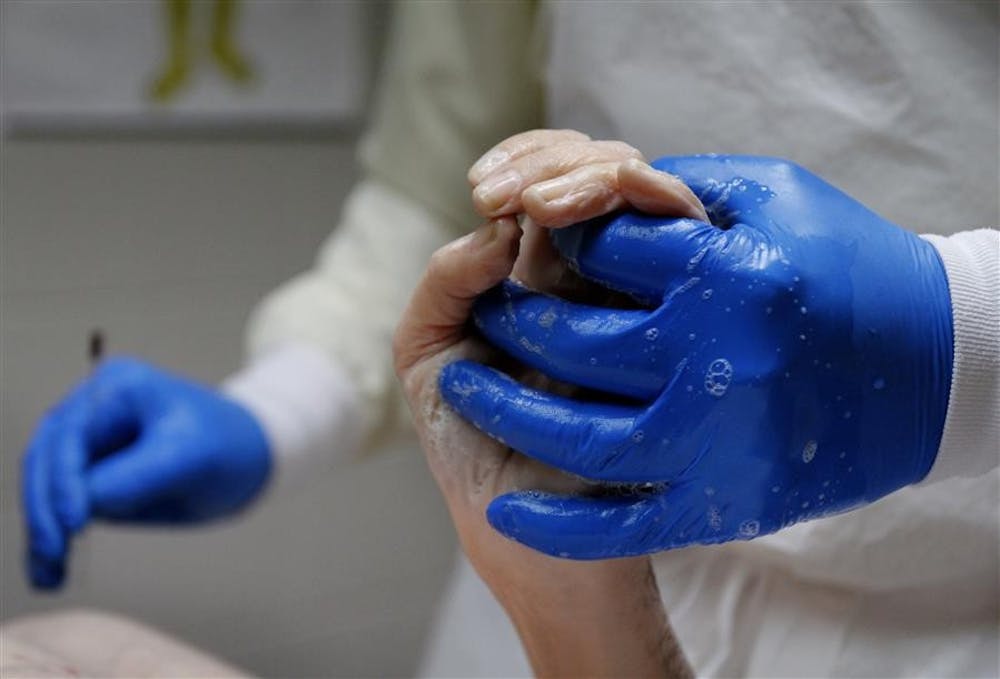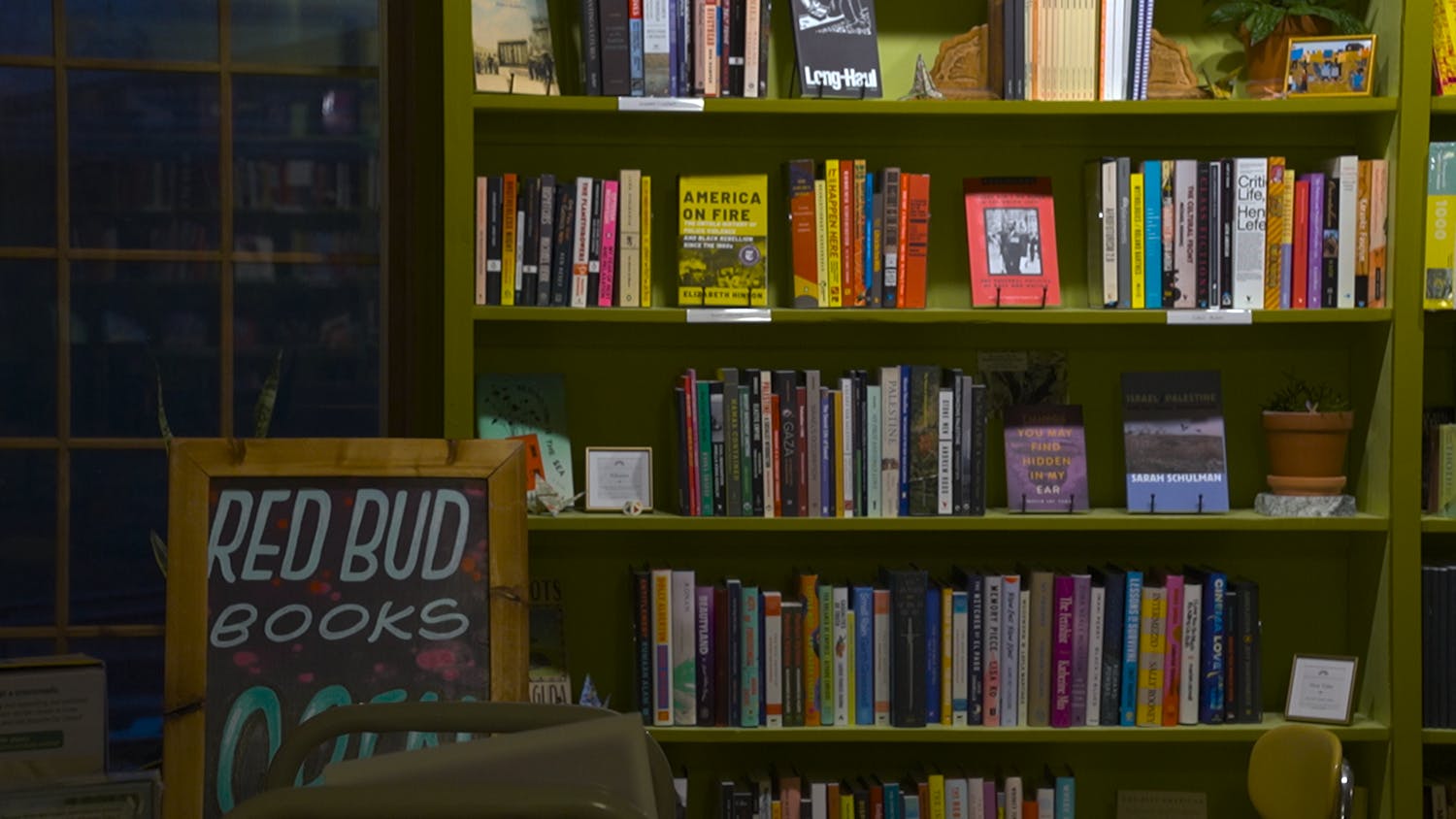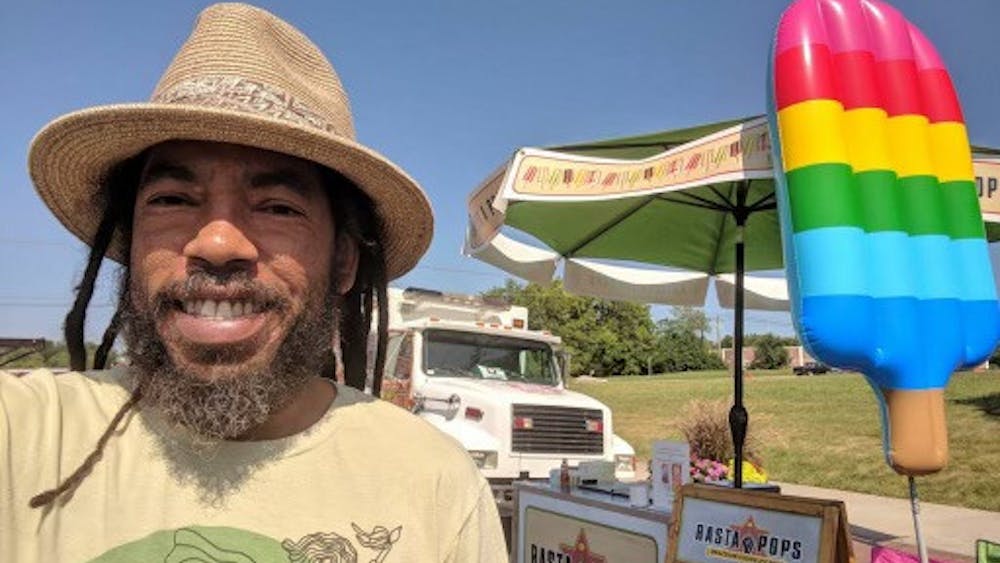ELLETTSVILLE, Ind. — The funeral director pours water over the woman’s body as he tells her about his day.
G.L. Chandler talks her through each step of the embalming. He smooths her thin gray hair. He places caps in her eyelids, gently closing them, shading her blue eyes. They no longer have the familiar glint that he knew for 25 years.
Once she is dressed in her black pants and purple ruffled shift, he helps tuck the woman into her light-pink casket. He leans in to rub her forehead.
“Hello, sweetie pie,” Chandler says.
The undertaker has faced death every day for more than half a century. He has embalmed countless bodies, helped generations of families cope with loss. But the 70-year-old funeral director is worn out. He has buried both of his parents, and now he is burying some of his best friends. Today, it’s Barb. A friend for 25 years.
Sometimes the job consumes him. Sometimes the white-haired man has to step outside with his cane and collect himself. Sometimes he’s too tired to come to work.
He thinks about death every day. More and more, he has begun to think about his own.
***
Chandler founded the only funeral home in Ellettsville, Ind. in 1976. Now, Chandler Funeral Home buries about 120 people each year, sometimes six in a day.
His name can be heard in Ellettsville grocery stores and around dinner tables, the man who has buried members of hundreds of families in the small town. He often cracks jokes about the heavy-set bodies he embalms and playfully whacks his other funeral directors, Ron Wayt and David Jarrett, in the butt with his cane.
His thick Kentucky accent can be heard yelling out of his Cadillac window, “Hey Pedro,” to a construction worker who appears to be Hispanic.
“I have a tendency to say the wrong thing at the wrong time,” he says.
He has never had much of a filter, and his friends sometimes tell him he never shuts up. His first wife, Susan, calls him a clown.
“I think that’s kind of why he’s so quirky,” Susan says. “It’s how he deals with it.”
His laid-back kindness makes customers feel like family, Jarrett says.
“There’s not one other person that’s taken better care of this community than he has,” Jarrett says.
If it were up to Chandler, he would live until he was 200. He doesn’t worry about his own death. After all, he gets a free funeral. He has even reserved a tombstone at Chambersville cemetery in Ellettsville.
More than anyone, Chandler understands the reality of death. It’s coming, and he might as well be ready.
***
Growing up in Slaughters, Ky., a town of about 200 people, Gabriel Lorenzo Chandler Jr. always wanted to be a funeral director.
It might have been the undertaker who would come to Slaughters — his hearse was the blackest, shiniest car Chandler had ever seen. As a 6-year-old, Chandler would walk around with a little black book, his funeral bible. He remembers burying dead birds, making marks where he left them.
When he was 15, he says, his mom drove him 10 miles so he could work for a funeral home in the area.
For about 20 years, Chandler ran the funeral home on his own. He and his wife Susan and their son Jeff lived in an apartment upstairs. He spent every hour of the day performing services. It was a time before cell phones, when funeral directors did everything, including driving ambulances to late-night death calls. On some nights Chandler had to wake up multiple times to pick up bodies.
Susan answered phones and met with families. They never did anything as a family, she recalls. She went on her son’s Boy Scout camping trips while Chandler tended to the home.
Chandler was married to the business. He has divorced three times.
“I’ve never really been able to divorce myself from the funeral business,” Chandler says.
The closest thing to love for Chandler was probably when he was married to his first wife, Susan, he says. But even then, things got in the way. Sometimes it was the temptation of other women. Sometimes, families at the funeral home took priority over his own. But as long as the town loved him, it didn’t matter that he wasn’t perfect.
“That was the only thing I ever did in my life that was right I think,” Chandler says. “I can’t imagine not being able to go down there and sit in my chair.”
Like his father’s old grandfather clock in the main entrance to the funeral home, Chandler is always there.
The image of a round face with small eyes on the grandfather clock watches every client that steps through the door. The clock’s tired hands have ticked for more than 25 years in the same corner, its pendulum swinging back and forth.
***
It was September when Chandler realized Barb was dying. She was his blue-eyed friend of more than two decades, the wife of a former employee, the woman he called “sweetie pie.” Barb had fought ovarian cancer for three years, but the doctors said there was nothing more she could do.
“I’m gonna lose my girl,” Chandler said.
Barb stopped in for a visit at her favorite funeral home, and the Chandler staff planned everything with her. The funeral would be held in her church, and her favorite minister would read the 23rd Psalm. She ordered a casket bouquet of lavender roses and chrysanthemums.
It seemed perfect. She was almost excited for the funeral. She couldn’t stop talking about it to her husband or to Chandler.
Chandler talked to Barb on the phone two to three times a week. She would often stop by the funeral home with Chandler’s favorite horehound candy from Cracker Barrel or freshly made chocolate-chip cookies.
Whether Chandler knows the client or not, he tries to treat everyone equally. But with Barb, he knew the funeral wouldn’t quite be the same. And listening to her talk about her approaching funeral didn’t make the wait any easier, he said. It made it that much more real.
In her last week alive, Chandler visited his old friend in hospice, even though he was reluctant at first. He wondered whether she would be responsive. Would people think he was there on business?
She was heavily medicated, but as soon as Chandler walked in, her face lit up.
Chandler knelt down, and took her hand, and kissed her cheek.
Chandler didn’t stay long — Barb was weak and tired. But he hoped this wouldn’t be the last time he would see Barb. He was certain Barb was headed to heaven, and he knew she wouldn’t be alone. He had sent many friends ahead of her. Chandler had even asked Barb to say hello to his mom when she got there.
“You’d better believe it,” Barb said.
Barb also had a final request for Chandler. She asked him to play a specific song at her funeral, a tune that was all too familiar to him. It was the same song played at his mother’s funeral.
“When God calls my number and it’s time to go/ I’ve made preparations and I want you to know/ I’ll be in that number that meets in the air/ Make me a promise that you’ll meet me there.”
***
Working with bodies doesn’t bother Chandler. Embalming is the easy part, he said, and, sometimes, he finds himself talking to the dead. It helps occupy his thoughts. It makes it a little bit easier.
One time, a woman’s body was left in the funeral home for 13 days — the family wouldn’t claim her. He would chat with her every day in that embalming room.
“We got to be buddies,” Chandler says. “You don’t have to worry about the dead ones — it’s the live ones you’ve got to watch.”
The funeral director’s job isn’t to cry with people. It’s to help families get through the rough. Chandler keeps a calm front even when he’s not on the job. He didn’t cry at his mom’s funeral, and Chandler’s first wife, Susan, says she never once saw him cry.
“I guess I’m just programmed to do that,” he says. “You just divorce yourself from what you’re doing.”
If he’s learned anything in his 55 years in the business, it’s that nothing is permanent — if he gets too attached to something, or someone, they could be gone in a blink.
The funeral home has been the only stable part of his life — a place that faces endings on a regular basis but seems to never have an end of its own.
Like the floral wallpaper that hasn’t changed, like the grandfather clock that hovers in the corner, like the tombstone with the funeral home’s name carved in front of the building, the Chandler Funeral Home seems set in stone.
***
Chandler never plans to retire. This summer, he plans to move out of his house a few streets away and return to his apartment above the funeral home. He just can’t get away, he says.
“This is my whole life right here,” Chandler says. “This has been constant.”
But he knows that someday, he will no longer be able to oversee the funeral home. He will have to hand over the business to the other two funeral directors. His son Jeff will be the figurehead, but Wayt and Jarrett promise to continue what Chandler started. They will carry on his motto, “Family Caring When You Need It The Most.”
“Do you love your mama?” Chandler always says. “Then you treat everyone who walks through this door like you would your mama.”
Wayt, who left a job dressing Disney characters in order to dress the deceased, has brought a fresh pair of eyes to the home. Chandler has been stuck in the past — he refuses to understand technology and uses nothing but the large blue typewriter behind his desk.
Since he’s gotten older, Chandler has trusted Wayt and Jarrett more and more. But he resists change. He’s not looking forward to the day when he will no longer be sitting at his beat-up desk.
Down the hall, the grandfather clock chimes. It’s the end of the workday, and the pendulum keeps swinging.
***
Barb’s body lies at the front of the church, surrounded by flowers.
Tissues pile up on the sides of pews as a tear-filled audience of 250 listens to Barb’s song.
Chandler reminds himself that this is just another funeral. But the song keeps playing.
“I was trying to think of anything but,” Chandler says about the funeral. “And they had to play that dumb song.”
“Make me a promise that we’ll meet someday/ Where mansions are waiting in that land far away.”
Chandler furrows his eyebrows, clenches his chin, holding in the tears. He doesn’t cry in front of the others — he waits until much later.
After the service, Chandler walks around the back of the church, patting old friends on the back, shaking hands, hugging members of the audience he’s known for decades, family members of Ellettsville residents he once buried.
One by one, each family member walks up to Barb’s casket, touches her hand, whispers goodbye.
Wayt steps forward to take her glasses off and he hands them to Chandler.
“Why don’t you take me a picture of her?” Chandler asks, handing Wayt his iPhone.
Wayt snaps a photo of Barb in her casket, then closes the lid.
***
As Barb’s funeral comes to an end, Chandler refuses to help carry her casket. Barb’s husband had asked him to be a pallbearer, but it was just too hard for Chandler to swallow. Burying a body is always the hardest part.
After leaving the church, Chandler’s Cadillac leads the dozens of cars into Chambersville cemetery. Gathered around Barb’s closed casket at her gravesite, the minister leads them in a final reflective Bible verse, 2 Corinthians 4:18.
“We fix our eyes not on what is seen, but on what is unseen, since what is seen is temporary, but what is unseen is eternal.”
As the Cadillac drives away from the gravesite ceremony, Chandler sits in the passenger seat, telling Wayt to drive off the road onto the lawn. He wants to go see his grave.
Chandler quietly hums the tune of “Make Me a Promise” as he stares out at the tombstones of more than 500 people he has buried here throughout the decades. He thinks about their stories, their families, their grief.
They drive to the far corner of the hill, overlooking the nearby city street. He points at one tombstone, the tallest in the row. The tombstone was carved recently with the name “Chandler.”
He picked the spot himself, the corner on the hill overlooking North County Line Road. If he’s going to be stuck in that cemetery forever, Chandler says, he might as well be able to flip off the people driving by.
Chandler knows heaven exists, but he’s not sure if he’s going to make it.
He knows he’s made his share of mistakes. There were times when he was loyal, and there were times when he wasn’t.
But those were the choices he made, and he can’t look back, he says.
“You try to live your life to the fullest and try not to hurt people,” Chandler says. “That’s where I’ve screwed up, and that’s not good.”
When he’s buried, in that hillside overlooking the street, his full name will be carved into the tombstone. He has already picked out the words to go with his name.
“I’ll be quiet now.”
***
Three days before Christmas, a month since he buried Barb, Chandler fights tears as he walks through the ruins of the funeral home. The night before, Wayt had stepped inside to find 15 inches of rushing water.
The water had spilled in from Temperance Street, where it reached almost over Wayt’s head.
Mud, branches, leaves and sewage floated into the home in the murky water, causing $200,000 worth of damage.
The carpeting is ruined, the dry wall will need to be replaced two feet up the wall, three sofas will be thrown out and the entire inside of the home will need to be reconstructed.
The flood is a wake-up call, Chandler says, and maybe it’s a sign.
“Maybe the good Lord is trying to tell me something,” Chandler says. “Shape up, boy.”
Time is limited, Chandler realizes. Water wears away even stone. Everyone will eventually be swept away.
Chandler is shaken, but he knows it could have been much worse. He vows to return the funeral home exactly to how it was — the same floral wallpaper, the same 1970s decorations.
“We’re bringing it back from the dead,” Chandler says.
In the corner, the grandfather clock stands covered by white plastic.
The pendulum doesn’t swing. It’s broken.






